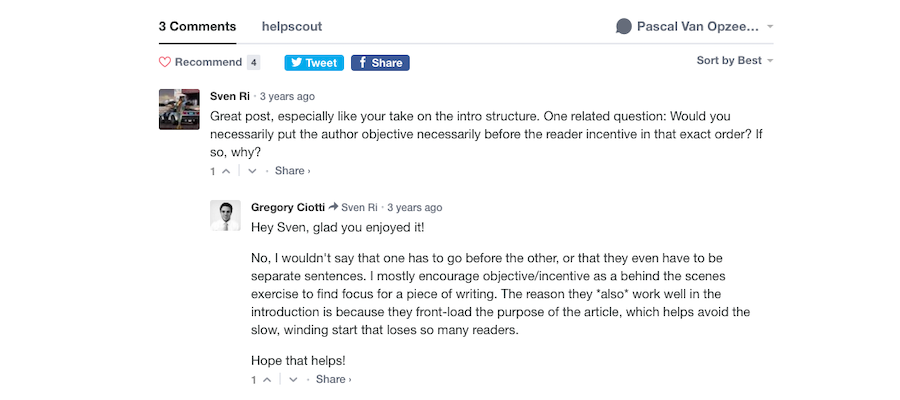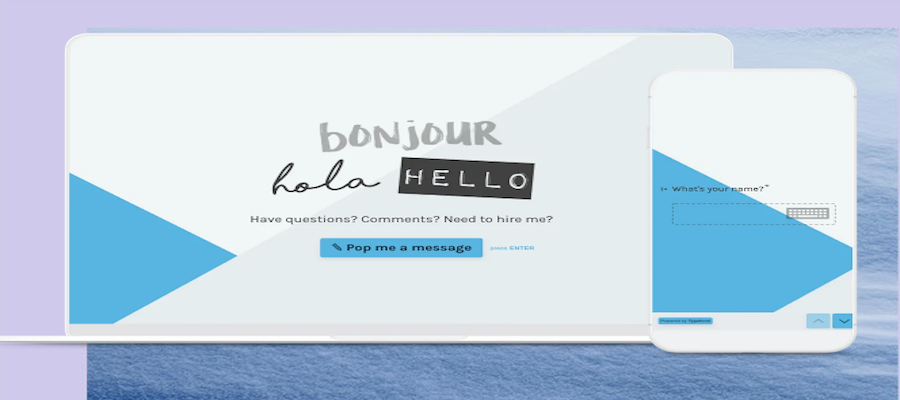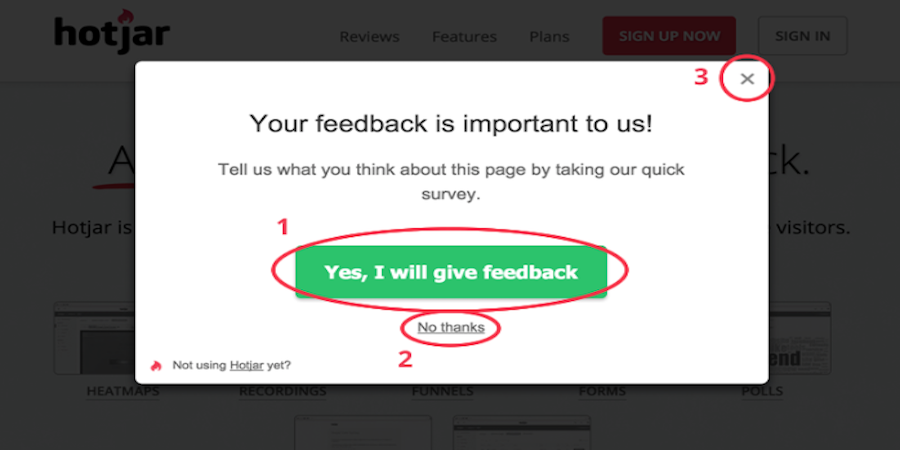How to Engage Users on Your Website: 6 Ways to Connect to Your Website Visitors
- Comment Sections
- Live Chat
- Contact Forms
- Browser Sharing
- Webinars
- On-Site Surveys
- Connect to perceive
Tools like Google Analytics have given us the flexibility to look at a lot of the action going on behind the screen. We tend to see how many people come to our site each day, where they’re from, and how long they stay.
You can run fancy analyses on these numbers, however, they can’t tell you everything. Who are these people? What are they searching for?
To increase your understanding of those who’ve landed on your web site, you need to actually connect with them. Meaning, participating in active two-way communication.
Here are 6 straightforward ways to connect to your website visitors:
#1 Comment Sections
You generate website content to attract visitors and win them over with valuable ideas. However, static articles are like one-sided conversations. Dialogues are more exciting than monologues, which is why adding a comment section is a great way to have your website guests join in on the conversation.
Comment sections enable your visitors to share their own opinions, ideas, and questions about your content. What's more, you’re showing your visitors you value their thoughts and are curious to learn from others who may think differently from you.
Example of a Disqus section at the Help Scout blog. It's great to be able to interact with the writer of a piece you enjoyed.
With support content, adding a comment section is a great path to allow your customers to interact with and help each other. You’ll also be able to see frequent issues users are having, which in turn gives you direct feedback on how you could better your product or service. Feel free to join in on the conversation to help them to the right solution or ask them to contact you directly if the issue needs more assistance.
Use software like Disqus to enable a comment section on your site. With the plug-in, your website visitors can comment, reply to each other’s comments, and react to posts with emoji. You’ll be able to write back, too.
#2 Live Chat
Live chat solutions like Userlike enable you to connect with your website guests in real time. When a visitor has a question, she can simply click on the chat widget and start chatting with a member of your customer support team right away.
The instantaneity of live chat simulates a face-to-face conversation since it allows customers to ask questions as they arise during the chat. Use proactive chat to contact your visitors before an issue arises. This shows that you’re willing and eager to help. Just make sure you’re being more helpful than bothersome:
We often use live chat with a page-specific message for our visitors.The page that they're on gives us a pretty good idea of the things they're struggling with. With that information in mind you can craft the right message. The trick here is not to be annoying and do this on every page.
Steven van Vessum, VP of Community at ContentKing.
Chatbots are a specific sub-category of live chat. Due to advancements in machine learning and natural language processing, you find plenty of chatbots active on websites. They're still not at a point at which they could compete with their human counterparts, but chatbots are great for answering frequent questions. Here are some key facts and statistics on the current stage of chatbots.
#3 Contact Forms
Filling out an online contact form is basically the same as sending an email, with the added benefit of being able to remain on the website. Plus, your visitors won’t have to search for the right email address and they’ll be able to skip over the possibility of copying the recipient address incorrectly.
You can build your own contact form with a tool like TypeForm. They offer customizable features to match your form with your website’s style. You have the option to embed the contact form right on your website or as a pop-up window.
When using contact forms on your site, be sure to experiment with the number of fields in your form. Most marketers will advocate for shorter forms, but you might find that longer forms (with more qualifying questions) help you attract the right type of audience, ie: folks who are more likely to convert.
- Cherie Foo, Content Strategist at UpLead
#4 Browser Sharing
Sometimes, words just don't cut it― you need visuals. Giving directions over the phone is cumbersome, and when it comes to technical issues, explaining the problem can be especially frustrating. With browser sharing, you make it easy on your website visitors (and yourself) by showing while talking.
Screen sharing solutions like Teamviewer enable your customers to share their screens with someone from your team. This way, you’ll be able to see exactly what your customer sees and actually show what she should do.
#5 Webinars
Connect to some of your visitors around the world without leaving your office. Webinars are, in short, a video conference between a member of your team and one or multiple (potential) customers. In a webinar, you’ll be able to go more in-depth about your company, product or service. They are a great way to filter leads out of your traffic.
You’ll want to make sure that you’re fully prepared before and during the webinar, so read this article to learn some things you should consider before choosing to use webinars.
#6 On-Site Surveys
Allowing your website visitors to provide direct feedback gives them a voice and the power to be heard. And getting direct, no fuss feedback on your product, service or website is great at any step of the process. Add surveys to your site to get straight-to-the-point insights on what your visitors are thinking.
It’s important that the survey you make asks the relevant questions that are important to you so that you’re getting enough information, while also keeping it short.
Using a number evaluation of 1-10 to rate their satisfaction with your website isn’t enough. Asking your visitors to rate more specific statements like, “It was easy to find product information on what I was looking for” is a more effective way to get conclusive answers. It’s also a great idea to add a short reply section, where the visitor can write any suggestions, point out issues or share things that went well for her.
Also, consider adding integrating surveys that show after crucial events on your website. After your webinar, for example. This allows you to get direct feedback on how your visitors experienced that event.
You can also go in the direction of a lead generation survey or assessment. With this, you deliver highly valuable and personalized content to the visitor while collecting information that you can use for subsequent targeting. A great example is Eneco, a Dutch Utility company, which collected 1000+ leads in 6 weeks by putting an interactive survey on their site.
Connect to perceive
Connecting along with your web visitors is the first step toward understanding them better. A deep understanding of your audience, in turn, gives you insight into how to improve your offering, how to raise your traffic, and how to turn them into leads and customers.
Read Also
Must-Have Digital Marketing Tools in 2019
How to Increase Conversions of WooCommerce Product Pages
10 Ways to Boost Inbound Leads and Skyrocket Sales
For TemplateMonster Affiliates Only! Boost Revenue with Free Elementor Banners
Don’t miss out these all-time favourites
- The best hosting for a WordPress website. Tap our link to get the best price on the market with 82% off. If HostPapa didn’t impress you check out other alternatives.
- Monthly SEO service and On-Page SEO - to increase your website organic traffic.
- Website Installation service - to get your template up and running within just 6 hours without hassle. No minute is wasted and the work is going.
- ONE Membership - to download unlimited number of WordPress themes, plugins, ppt and other products within one license. Since bigger is always better.
Get more to your email
Subscribe to our newsletter and access exclusive content and offers available only to MonsterPost subscribers.







Leave a Reply
You must be logged in to post a comment.